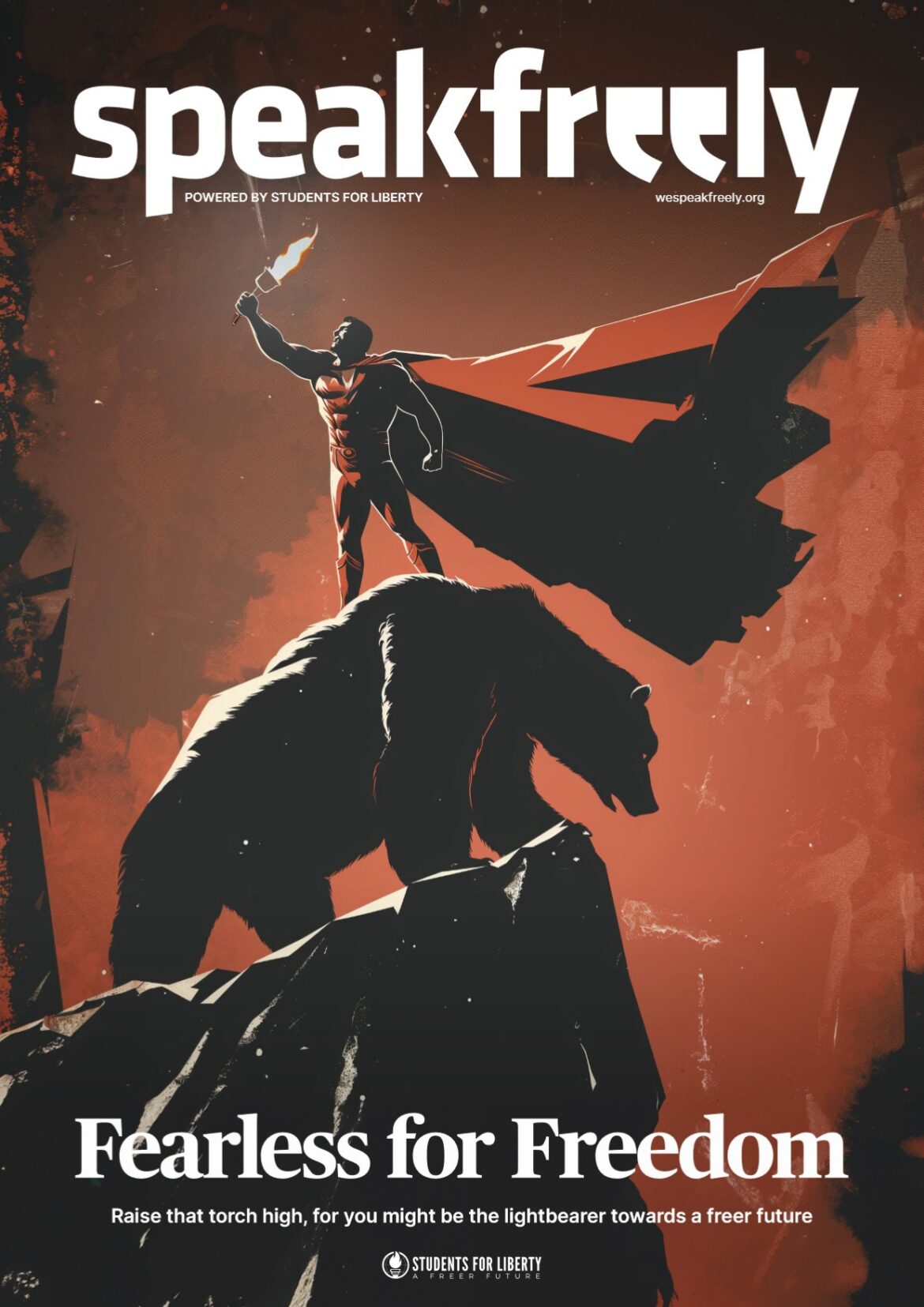The following article was first published in SpeakFreely’s Fearless For Freedom print issue, Tbilisi Georgia, April 2024.
“Dinner is served,” your host says as she places two steaming glass dishes on the table. Your mouth waters, but you let the other guests fix their plates first. After fixing yours, you cut eagerly into the fried chicken, top it with some cheesy potato casserole, and take a bite.
It’s so tasty, so crunchy, so cheesy, that you barely notice the conversation around the table. But then you hear: “… and that’s why we need sweeping gun restrictions.”
“Couldn’t agree more; not to mention higher taxes to discourage things like marijuana, alcohol, and gambling,” someone else says. “Yeah, and let’s put that extra tax revenue toward defence spending,” a third person adds. “There are 195 countries in the world, and we only have military bases in 80 of them.”
And here, as another perfect bite of chicken and potato dangles from your fork, the conundrum arises. You’ve heard it all your life: money, religion, and politics are that unholy trinity of topics to avoid in polite conversation. Besides, it’s been a pleasant dinner party so far; coffee and dessert are still to come, and you don’t want to ruin the evening. You’ve read the room, too: mostly young, urban professionals who grew up in middle-class suburbs, attended big state universities, and probably call themselves progressives.
To eat or not to eat that next bite? That is the question. To chime in, or stay silent?
Well, if money, religion, and politics can’t be discussed in person, they won’t just go away. Those conversations will still take place—just in the form of tweets and posts and viral videos on platforms whose algorithms will make our differences seem more pronounced and our interests more siloed. If we’re fearful of those “forbidden” topics of conversation, in real life, what chance do we have?
So I say: Be fearless (when the moment is right).
I add the caveat “when the moment is right” to encourage careful judgement. There’s no faster way to gain a reputation as a “contrarian” or “that crazy libertarian friend”—as I have within several friend groups—than to interject every time, all the time. If you know your argument will be drowned out, misunderstood, misrepresented, or taken in bad faith, then it might be best to take that next bite.
But every so often, the stars align. You’ll find an opening in a conversation, or you’ll meet someone and sense a libertarian streak in him or he —maybe just a different or unusual way of looking at the world—and the moment will be right to engage, to probe, to debate … and, yes, maybe to convert someone to the ideas of liberty. In doing so, you might just make the world a slightly better place.
That’s all we can really do. We’re not likely to change the whole world in one fell swoop (or even several swoops). I don’t put much stock in revolutions, elections, or writing to my congressman. I certainly don’t believe in violent protests or overthrows or coups as ways to achieve the world we want. And although I’m deeply proud of the videos I help make for Learn Liberty and know they raise important points, in large part, our audience has already been persuaded.
As cliché as it sounds, our best bet is to change the world one good deed, one smile, one conversation at a time.
I know it’s never that simple. Whether to speak up or zip your lips when you don’t know how your message will be received will depend on countless different factors. I’m afraid I can’t help with that process of careful judgement I encouraged. For one, you know your audience better than I ever could. Plus, I’m not good at this judgement call; I tend to speak up too much, often making my friends scoff, “There goes Trevor again, talking about Louie von Mices or whoever.”
But when you sense an opening, attack it—and be fearless! I do at least have one positive example to cite: I recently attended a hockey game with my brother, some friends of his, and one of their sisters—an avowed Marxist. We were deep into the subjective theory of value by puck drop. Luckily, we kept things cordial, had a good chat, and didn’t ruin anyone else’s evening … although I haven’t convinced her of anything, either. (I do think I’ve proven, at a minimum, that I’m not an evil monster despite loving capitalism and markets.)
Now, you might ask: What grounds do we have for fearlessness? Because often, when we venture outside of our pro-liberty conferences and networks, we wade into murky waters. Emotion detached from logic; dogma; skewed understandings of history. I don’t know about you, but it often feels like I’m speaking a different language from my friends elsewhere on the political spectrum. It’s sometimes awkward, and usually daunting.
But here’s the thing: We are better, more consistent progressives than the left. “Defund the police,” cries a progressive. “Buddy,” you can reply, “let’s talk about defunding the state!” And we’re better, more consistent conservatives than the right. “We want lower taxes,” cries a conservative. And you can reply, “Buddy, lower taxes? Let’s talk about NO taxes!”
So liberty is more coherent and consistent than either side. And more!
Liberty is practical: It doesn’t require us to do anything beyond our means; only that we not coerce others. Liberty is humane: It offers the highest standard of living the world is capable of and helps the poor and marginalised the most. And liberty is ethical: It encourages us all to follow the Golden Rule—to treat others the way they want to be treated.
So don’t be rude. Don’t assume you have all the answers. But do know that you have some of them. Do have the courage of your convictions. And do be fearless (when the moment is right).
